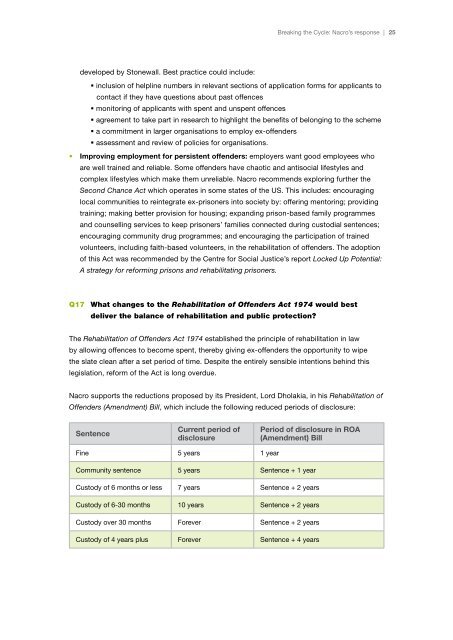Nacro's response to Breaking the Cycle Green Paper
Nacro's response to Breaking the Cycle Green Paper
Nacro's response to Breaking the Cycle Green Paper
Create successful ePaper yourself
Turn your PDF publications into a flip-book with our unique Google optimized e-Paper software.
<strong>Breaking</strong> <strong>the</strong> <strong>Cycle</strong>: Nacro’s <strong>response</strong> | 25developed by S<strong>to</strong>newall. Best practice could include:• inclusion of helpline numbers in relevant sections of application forms for applicants <strong>to</strong>contact if <strong>the</strong>y have questions about past offences• moni<strong>to</strong>ring of applicants with spent and unspent offences• agreement <strong>to</strong> take part in research <strong>to</strong> highlight <strong>the</strong> benefits of belonging <strong>to</strong> <strong>the</strong> scheme• a commitment in larger organisations <strong>to</strong> employ ex-offenders• assessment and review of policies for organisations.• Improving employment for persistent offenders: employers want good employees whoare well trained and reliable. Some offenders have chaotic and antisocial lifestyles andcomplex lifestyles which make <strong>the</strong>m unreliable. Nacro recommends exploring fur<strong>the</strong>r <strong>the</strong>Second Chance Act which operates in some states of <strong>the</strong> US. This includes: encouraginglocal communities <strong>to</strong> reintegrate ex-prisoners in<strong>to</strong> society by: offering men<strong>to</strong>ring; providingtraining; making better provision for housing; expanding prison-based family programmesand counselling services <strong>to</strong> keep prisoners’ families connected during cus<strong>to</strong>dial sentences;encouraging community drug programmes; and encouraging <strong>the</strong> participation of trainedvolunteers, including faith-based volunteers, in <strong>the</strong> rehabilitation of offenders. The adoptionof this Act was recommended by <strong>the</strong> Centre for Social Justice’s report Locked Up Potential:A strategy for reforming prisons and rehabilitating prisoners.Q17 What changes <strong>to</strong> <strong>the</strong> Rehabilitation of Offenders Act 1974 would bestdeliver <strong>the</strong> balance of rehabilitation and public protection?The Rehabilitation of Offenders Act 1974 established <strong>the</strong> principle of rehabilitation in lawby allowing offences <strong>to</strong> become spent, <strong>the</strong>reby giving ex-offenders <strong>the</strong> opportunity <strong>to</strong> wipe<strong>the</strong> slate clean after a set period of time. Despite <strong>the</strong> entirely sensible intentions behind thislegislation, reform of <strong>the</strong> Act is long overdue.Nacro supports <strong>the</strong> reductions proposed by its President, Lord Dholakia, in his Rehabilitation ofOffenders (Amendment) Bill, which include <strong>the</strong> following reduced periods of disclosure:SentenceCurrent period ofdisclosurePeriod of disclosure in ROA(Amendment) BillFine 5 years 1 yearCommunity sentence 5 years Sentence + 1 yearCus<strong>to</strong>dy of 6 months or less 7 years Sentence + 2 yearsCus<strong>to</strong>dy of 6-30 months 10 years Sentence + 2 yearsCus<strong>to</strong>dy over 30 months Forever Sentence + 2 yearsCus<strong>to</strong>dy of 4 years plus Forever Sentence + 4 years
















